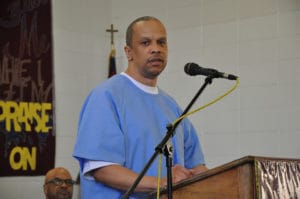My 67-year-old friend is not violent, but California would beg to differ. At his sentencing, the judge told him, “You are a Vietnam trained killer,” and then sentenced him to 68 years to life. His crime? One day my friend broke into an unoccupied house. After he was caught and tried, he was convicted of burglary and sentenced under California’s Three-Strikes law.
We call him Cadillac, mainly because he is easy going and always has a smooth reply when people joke with him. Maybe it’s because he wants to go home to his grandkids, or perhaps it’s the 20-plus years of incarceration Cadillac has already completed, but Cadillac was really excited by the passage of Proposition 57 last November.
This proposition was specifically designed to end overcrowding in California’s prisons, and one of the principle ways it would do so was by offering the opportunity for nonviolent offenders who’d met certain rehabilitation standards to be released. The language of the proposition clearly gave Cadillac a reason to hope: “Any person convicted of a nonviolent offense and sentenced to prison shall be eligible for parole consideration after completing the full term of his or her primary offense.”
Finally, after 21 years of rehabilitative programming on various prison yards, Cadillac was going to get his chance to make his case for why he was prepared to return to society safely.
This proposition was specifically designed to end overcrowding in California’s prisons, and one of the principle ways it would do so was by offering the opportunity for nonviolent offenders who’d met certain rehabilitation standards to be released.
Unfortunately, because Cadillac is a repeat offender, Prop 57 will not offer him instant relief. The bureaucrats who drafted the specifics of how this law will be implemented decided that, contrary to California laws, any person convicted of a third strike will be treated as a violent offender, regardless of whether their crime was violent or not.
Cadillac’s situation is not unique. He is merely one of a growing list of prisoners who have committed property crimes or finance-related crimes decades ago, and have participated in extensive rehabilitation programing since, yet are still not eligible for release because of an arbitrary label attached to their crime. In California, if your crime has been labeled “serious” or “violent,” and you have been given a life sentence, there has been no relief offered by the recent rash of sentencing reform propositions that voters have passed.
Prop 57 was supposed to fix that, and finally address the systemic issues that led to our prison system being labeled “cruel and unusual” by the U.S. Supreme Court.
The bureaucrats who drafted the specifics of how this law will be implemented decided that, contrary to California laws, any person convicted of a third strike will be treated as a violent offender, regardless of whether their crime was violent or not.
But instead, politicians have ignored the mandate offered by California voters, and are interpreting Prop 57 in a way that will make certain cosmetic changes, while leaving the majority of our state’s sentencing issues intact.
Simply put, we need to end the designation of some of our prisoners as “violent” or “serious” and instead look at the totality of their conduct both inside and outside of prison. Most crimes are triggered by something, whether it is insecurity, feelings of low self-worth, or drug use.
When the California Department of Corrections and Rehabilitation dedicated itself to rehabilitation, it instituted programs that would help people change their criminal behavior, but California has not yet instituted a release plan that acknowledges successful rehabilitation. At the point when rehabilitation occurs in an objective and measured way, the labels of “violent” and “serious” begin to work against the CDCR making smart decisions on incarcerated people.
We need to end the designation of some of our prisoners as “violent” or “serious” and instead look at the totality of their conduct both inside and outside of prison.
Instead of giving people the opportunity to prove their rehabilitation and return to society, California continues to spend billions of dollars incarcerating people unnecessarily. This is money that could be redirected into more preventative measures, like education, job training and infrastructure support for high risk communities.
Many would argue that any person who commits multiple felonies and goes to prison numerous times should always be considered dangerous to public safety. I would remind those people of the substantial research that when people reach a certain age, their likelihood to reoffend diminishes significantly.
But instead of merely relying upon people aging out of crime, Prop 57 promotes rehabilitation and requires vigorous vetting before a person is released. As a person who has been incarcerated for 14 years and seen California’s transition from merely housing people to creating opportunities for rehabilitation, it is my belief that through rehabilitation and rigorous vetting, California can follow the letter as well as the spirit of Prop 57 and make all non-violent offenders eligible for release.
Cadillac would be the first to tell you that all crime is serious. And he’s spent the last two decades learning the skills that make him a productive member of society if he’s ever released.
It is my belief that through rehabilitation and rigorous vetting, California can follow the letter as well as the spirit of Prop 57 and make all non-violent offenders eligible for release.
We should help him by taking this opportunity to transform our criminal justice system into one that does not merely punish for punishment’s sake, but instead uses incarceration to create an opportunity and incentive for rehabilitation, and then allow those rehabilitated people to return home to transform the communities they came from.
James King is an incarcerated writer who resides at San Quentin. One of his passions is criminal justice reform. Send out brother some love and light: James King, Prison University Project, P.O. Box 492, San Quentin, CA 94964.






